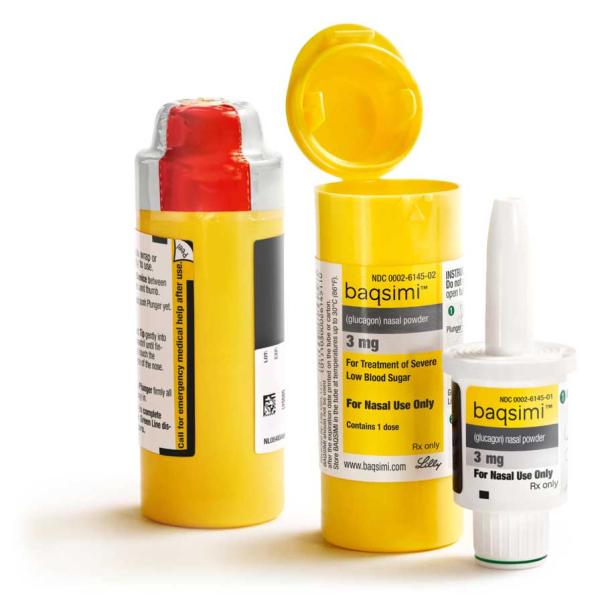Generic Baqsimi Availability
Last updated on Aug 6, 2025.
Baqsimi is a brand name of glucagon, approved by the FDA in the following formulation(s):
BAQSIMI (glucagon - powder;nasal)
-
Manufacturer: AMPHASTAR PHARMS INC
Approval date: July 24, 2019
Strength(s): 3MG [RLD]
Is there a generic version of Baqsimi available?
No. There is currently no therapeutically equivalent version of Baqsimi available in the United States.
Note: Fraudulent online pharmacies may attempt to sell an illegal generic version of Baqsimi. These medications may be counterfeit and potentially unsafe. If you purchase medications online, be sure you are buying from a reputable and valid online pharmacy. Ask your health care provider for advice if you are unsure about the online purchase of any medication.
See also: Generic Drug FAQ.
Related patents
Patents are granted by the U.S. Patent and Trademark Office at any time during a drug's development and may include a wide range of claims.
-
Nasal powder formulation for treatment of hypoglycemia
Patent 10,213,487
Issued: February 26, 2019
Inventor(s): Mantripragada Sankaram & Piche Claude A. & Van Betsbrugge Jo Jan Filip
Assignee(s): Eli Lilly and CompanyThe present invention provides a powder formulation containing glucagon or a glucagon analog for nasal administration, useful in the treatment of hypoglycemia, and in particular the treatment of severe hypoglycemia. The present invention also provides a method of making this powder formulation, and to devices and methods for using the powder formulation.
Patent expiration dates:
- February 16, 2036✓✓
- February 16, 2036
-
Medication delivery systems and methods
Patent 10,765,602
Issued: September 8, 2020
Inventor(s): Arnett Jaime Ray & Snow Andrew Thomas
Assignee(s): Eli Lilly and CompanyThe present disclosure relates to a medication delivery system including a medication administration device, a medication within the medication administration device, a container defining a cavity receiving the medication administration device, and a cap attached to the container and sealing the medication administration device within the cavity. The medication administration device includes an actuator extending from a body and operable to expel the medication by depressing the actuator into the body. The cap includes hold down members positioned to bear against the body of the medication administration device to prevent movement of the medication administration device toward the cap beyond a predetermined distance. The medication administration device is thereby prevented, inter alia, from prematurely discharging the medication during storage and transport.
Patent expiration dates:
- September 23, 2039✓
- September 23, 2039
More about Baqsimi (glucagon)
- Check interactions
- Compare alternatives
- Pricing & coupons
- Reviews (1)
- Drug images
- Latest FDA alerts (1)
- Side effects
- Dosage information
- Patient tips
- During pregnancy
- FDA approval history
- Drug class: glucose elevating agents
- Breastfeeding
Patient resources
Other brands
Professional resources
Other brands
Related treatment guides
Related/similar drugs
Glossary
| Term | Definition |
|---|---|
| Drug Patent | A drug patent is assigned by the U.S. Patent and Trademark Office and assigns exclusive legal right to the patent holder to protect the proprietary chemical formulation. The patent assigns exclusive legal right to the inventor or patent holder, and may include entities such as the drug brand name, trademark, product dosage form, ingredient formulation, or manufacturing process A patent usually expires 20 years from the date of filing, but can be variable based on many factors, including development of new formulations of the original chemical, and patent infringement litigation. |
| Drug Exclusivity | Exclusivity is the sole marketing rights granted by the FDA to a manufacturer upon the approval of a drug and may run simultaneously with a patent. Exclusivity periods can run from 180 days to seven years depending upon the circumstance of the exclusivity grant. |
| RLD | A Reference Listed Drug (RLD) is an approved drug product to which new generic versions are compared to show that they are bioequivalent. A drug company seeking approval to market a generic equivalent must refer to the Reference Listed Drug in its Abbreviated New Drug Application (ANDA). By designating a single reference listed drug as the standard to which all generic versions must be shown to be bioequivalent, FDA hopes to avoid possible significant variations among generic drugs and their brand name counterpart. |
Further information
Always consult your healthcare provider to ensure the information displayed on this page applies to your personal circumstances.

